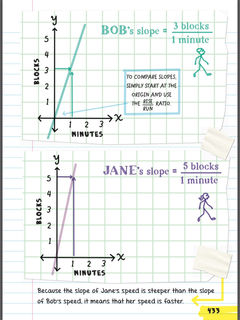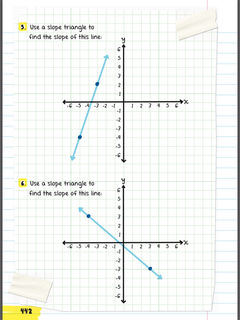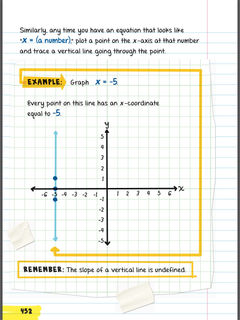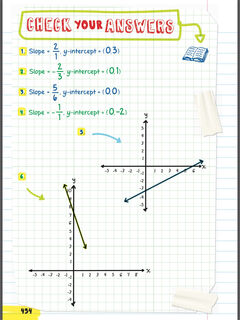Chapter 3 Resources
Linear Functions
Timeline
-
Lesson 3.1: Graphing Linear Equations
-
Lesson 3.2: Solving Linear Equations by Graphing
-
📝 Mini Quiz on Lessons 3.1-3.2
-
Lesson 3.3: Rate of Change and Slope
-
📝 Mini Quiz on Lessons 3.3
-
👉🏼 Mid Chapter Test on Lessons 3.1-3.3
-
Lesson 3.4: Direct Variation
-
Lesson 3.5: Arithmetic Sequences as Linear Functions
-
📝 Mini Quiz on Lessons 3.4-3.5
-
Lesson 3.6: Proportional and Non-Proportional Relationships
-
📝 Mini Quiz on Lessons 3.6
-
👉🏼 Chapter 3 Test on Lessons 3.1-3.6
3.1
Graphing Linear Equations
Study Guide
IXL Practice
Students will be able to...
-
Algebraically find x and y intercepts from an equation, then graph them to make the equation of the line
-
Given the equation, make a table to create the graph of the line
Practice this lesson on Khan Academy by clicking here
3.2
Solving Linear Equations by Graphing
Study Guide
IXL Practice
Students will be able to...
-
Interpret the meaning of the intercepts in word problems
3.3
Rate of Change and Slope
Study Guide
IXL Practice
Students will be able to...
-
Understand that rate of change and slope are the same thing
-
Memorize the slope formula
-
m=(y2 - y1)/(x2-x1)
-
-
Interpret the meaning of the rate of change/slope
-
Find the rate of change/slope from a table
-
Find the slope between two points
-
practice it here!
-
-
Find the missing x or y coordinate if you are given the slope and the other coordinate
Practice slope from a graph and slope from two points here.
3.4
Direct Variation
Study Guide
IXL Practice
-
This IXL below is not exactly like the ones we did in class, but it is a good practice to get used to slope:
Students will be able to ...
-
Memorize the direct variation formula
-
y=kx
-
-
Graph equations in y=kx format
-
Start at (0,0) then use the slope to create two additional points
-
-
Write a direct variation formula when you only know the value of y and x.
3.5
Arithmetic
Sequences as Linear Functions
Study Guide
IXL Practice
For the ones below, you simplify the equation once you plug in your numbers.
Students will be able to...
-
Analyze the pattern in numbers and continue the pattern
-
Whole numbers, fractions, mixed numbers, improper fractions
-
-
Memorize the formula for arithmetic sequences
-
Write an equation for an arithmetic sequence
3.6
Proportional and Non-Proportional Relationships
Study Guide
IXL Practice
Students will be able to...
-
Write equations from graphs and tables.
-
Find the slope
-
Identify the y-intercept
-
Plug those into this format y=_x+_ where the first blank is the slope and the second blank is the y intercept.
-
-
-
Understand how to write the equation in function notation
-
Change y= to f(x)=
-
Parts of a Graph Vocabulary
CHAPTER 3
Use the vocabulary word bank to fill in the boxes/blanks. Some words are used twice. Some boxes have more than one word if they have more than one meaning.
Check your answers when you are finished or when you are stuck.
This should take no longer than 15 minutes.
Direct Variation Jenga
CHAPTER 3
How to Play:
-
Each team builds their own tower
-
The person who has the birthday closest to today's date goes first. They push one block out, but one that isn't on the top two rows.
-
There will be a number on that block that corresponds to the question on your paper. Each person does the question independently.
-
Once everyone is finished, someone other than the play who pulled that block looks at the answer and shares it with the group.
-
If the person who pulled the block is correct, he or she will earn the points for that question. If the person is wrong, they will LOSE those points. Yes, there can be negative scores.
You can do these questions on whiteboards, just make sure you do not erase your answer until it is verified as correct or incorrect to earn your points. You must keep track of your own points.




























